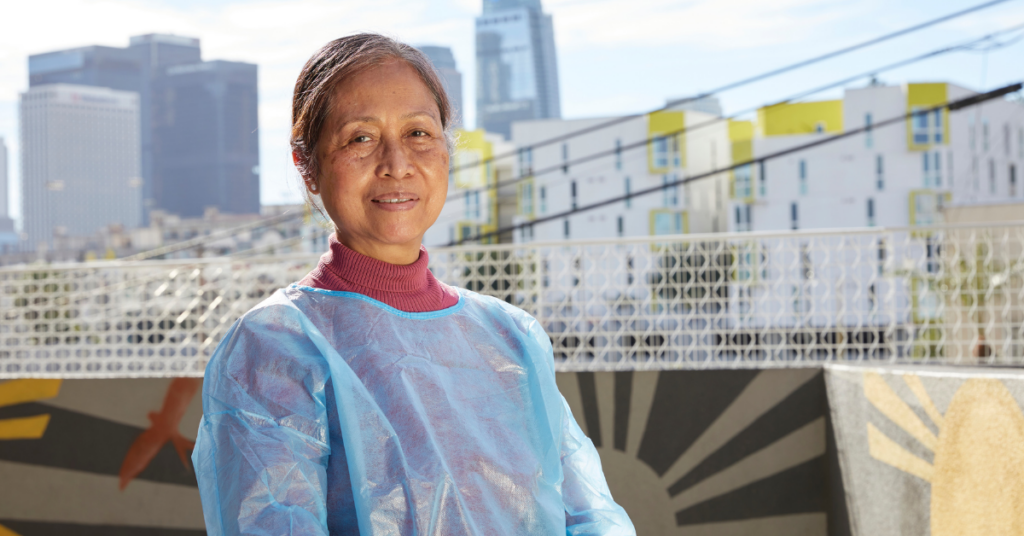
Through interviews and original photography, PHI is working with direct care workers nationwide to document their stories and share their ideas for transforming jobs in long-term care. This interview is with Teresita Sattar, a Caregiver at Courage LLC and Worker Leader at Pilipino Workers Center in Los Angeles, CA. She has been a direct care worker for 10 years.

“By becoming a caregiver, I have been able to continue my service to help others. I feel a sense of fulfillment when I know that I am able to give clients quality care.”
On why she decided to become a direct care worker
“Ten years ago, I came to America with the hope of pursuing a good life and happiness as I believe this is the land of opportunity as long as you work hard for it, using the knowledge and skills that we have achieved through our education and experiences. I was an RN in the Philippines for 27 years before coming to America, but I did not have a nursing license to practice here. By becoming a caregiver, I have been able to continue my service to help others. I feel a sense of fulfillment when I know that I am able to give clients quality care.”
On what she finds most challenging in her role
“When I became a caregiver, I learned that this job is often looked down on as the lowest class of workers. This job can be very much exploited, especially with regards to immigrants of color, particularly women. As a caregiver, we are in very close contact with our clients, and I develop much closer one-on-one relationships than when I was a nurse. We work so hard and sincerely from the heart. But we are being discriminated against, isolated, underpaid, and abused.
I experienced this myself with my first company, but I stayed for years because I felt that my client really needed my help, and I also needed to earn a living to survive. Then I left that company to work with the [homecare cooperative] Courage LLC. Courage gave me a good job that allows me to support myself and my family, and I benefit from paid sick leave and approval for overtime pay. They have also sent me to a national conference for cooperative home care workers, and this training has helped me work with clients more effectively. I feel grateful to them for giving me these opportunities and the chance to become one of the co-owner members of the cooperative.”
“We work so hard and sincerely from the heart. But we are being discriminated against, isolated, underpaid, and abused.”

“When people think of frontline workers, they often think of doctors, nurses, or police. But COVID-19 affects caregivers, too, and many of us are not being given the safety and protection that other workers are getting during this pandemic.”
On the impact of COVID-19
“When the pandemic started, I decided to pause working because I am over 60 years of age, and I know that I am very vulnerable to this virus. I am staying home with my 10-year-old grandson right now while his school is closed and am waiting for the pandemic to go away. It’s a big challenge because I have no income to support my family, but for now I have a little savings. But I am afraid that soon my savings will be gone, and I will have to find some other way to earn a living.
When people think of frontline workers, they often think of doctors, nurses, or police. But COVID-19 affects caregivers, too, and many of us are not being given the safety and protection that other workers are getting during this pandemic. Caregivers are suffering. We work with our hearts and our minds to give care to others, but I hope our elected leaders realize we also need care and protection.”
Photography: Rachael Porter @porterfiles
***
The Direct Care Worker Story Project aims to enhance the visibility of this workforce, amplify its voices, and draw on workers’ unique wisdom to inform policy and practice. The Project seeks to address the lack of representation of direct care workers in public narratives and ensure images used to depict long-term care work are grounded in workers’ and clients’ real experiences. If you’re interested in sharing your story as a direct care worker, please email us at info@PHInational.org.




